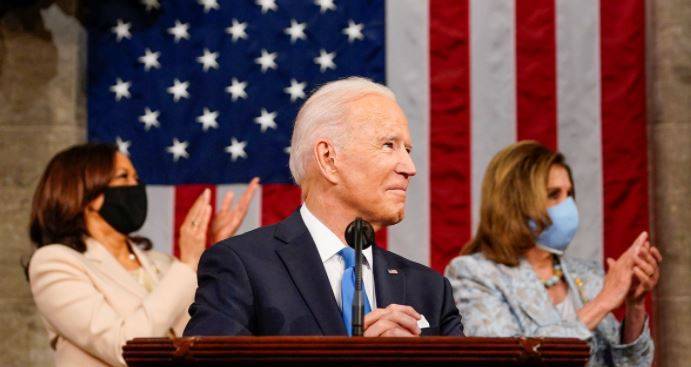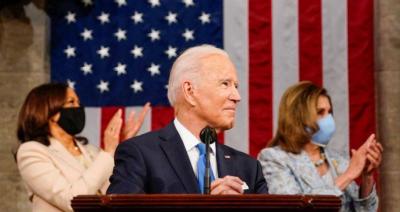On Wednesday, U.S. President Joe Biden stated that he has restored Americans' trust in democracy after 100 days in office, asserting that "the United States is ready for takeoff." This was during his first speech before a joint session of Congress, marking the first 100 days in his position, where he discussed details of new spending packages to support families, including childcare, education, paid leave, and extensions of certain tax deadlines, which will largely be funded through increased taxes on wealthy Americans.
Biden added, "Now, just 100 days in, I can say to the nation: America is moving forward again, turning danger into possibility, crisis into opportunity, and setback into strength. We are working again, dreaming again, discovering again, leading the world again." He emphasized that this national effort must now focus on rebuilding the economy and combating inequality through "the largest plan since World War II."
He noted, "After inheriting the worst pandemic in a century, the worst economic crisis since the Great Depression, and the worst attack on our democracy since the Civil War, we managed to pass the largest economic package in our history, and we are now seeing the results." Biden called on Congress to increase tax contributions from corporations and the wealthiest Americans to fund his family assistance plan, stating, "I will tax the rich and large corporations, and not add a burden on the middle class. It is time for American businesses and the richest 1% to pay their fair share."
Regarding the American Jobs Plan, Biden said it aims to rebuild the United States, adding: "Experts estimate that the plan will add millions of jobs and trillions of dollars in economic growth for years to come. It is the largest since World War II. About 90% of the jobs included in the plan do not require a college degree, with 75% not requiring a college degree at all." The president also remarked, "The job plan acknowledges something I have always said: Wall Street did not build this country. The middle class and unions built it." He highlighted that "over 1.3 million new jobs were created in the first 100 days of my presidency, the highest number of new jobs in the first 100 days of any president in U.S. history."
Biden praised the management of the COVID-19 crisis as one of the "greatest logistical achievements," stating: "There is still work to be done to eliminate COVID-19. We have shown that we are capable of rising above crises and difficulties. COVID-19 death rates have decreased by 70% during the 100 days, and we have delivered more than 200 million vaccine doses. More than half of adults have received at least one dose."
On China, Russia, Iran, and North Korea, the U.S. president affirmed that he is not "seeking conflict with China," but expressed his "readiness to defend America's interests across all areas." He said during discussions with President Xi Jinping, he informed him that they support competition, but "we will fight against unfair trade practices," "maintain a strong military presence in the Indo-Pacific," and "not abandon our commitments to defend human rights."
Biden stated he would work closely with U.S. allies to confront threats posed by Iran's and North Korea's nuclear programs "through diplomacy and strict deterrence." He also addressed relations with Russian President Vladimir Putin, noting he communicated his intent not to escalate against Russia, but that there are consequences for Moscow's actions, adding: "My administration responded to Russian interference in our elections and cyberattacks on our institutions with sanctions."
Concluding his speech, Biden remarked: "The horrifying images of the Capitol assault and the desecration of our democracy are still fresh in our memories. We must prove that democracy still works. Together, we have managed to restore the people's trust in the first 100 days. America is back on the right track." He stated that "gun violence has become an epidemic in the U.S., and we face the threat of groups that believe in white supremacy," calling for controls on gun sales in the country.
Biden urged the Senate to pass a major police reform bill named after George Floyd and implored Congress to vote on this legislation, which has already been passed in the House. He said, "I know that Republicans have their own ideas. We must work together to reach a consensus. Let’s finish this by next month, on the anniversary of George Floyd’s death," who died on May 25, 2020, after being kneeled on by a police officer.
Security forces in the Capitol had placed the building on maximum alert on Wednesday, in an event officially described as a "national security special event," with memories of the attack by supporters of his predecessor, Donald Trump, in January still looming over the building.
In a historic first, Biden stood at the center of Congress on the House Chamber platform, with both women in the designated seats for the Speaker of the House and Vice President, Nancy Pelosi and Kamala Harris, sitting behind him. Biden delivered his address to a much smaller audience inside the Capitol compared to the usual hundreds of members of Congress, Supreme Court justices, senior government officials, and guests, as the aim of reducing the audience was to implement social distancing rules.
In a historical precedent, all members of Biden's Cabinet were absent from the speech, and there was no designated survivor— a Cabinet member who remains in a secure safe room to assume power in case of any incident.




